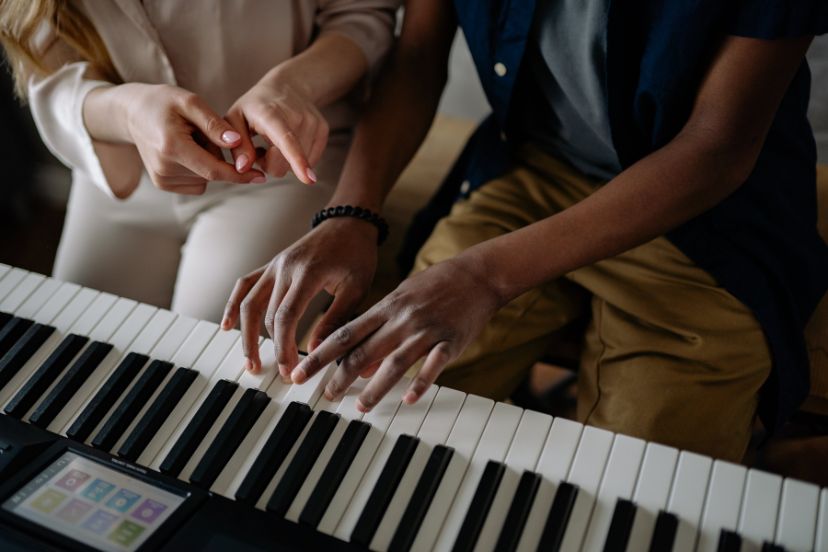For those looking to learn piano in a creative and enjoyable way, Creative Piano Academy offers…
How Long Does It Take To Learn Piano? A Comprehensive Guide

Learning to play piano is a fascinating journey filled with delightful melodies, challenging techniques, and rewarding progress. However, one question that often arises among beginners is, “how long does it take to learn piano?” Learning piano depends on numerous factors, such as your dedication to practice, the quality of teaching, your understanding of music theory, and the type of piano lessons you choose.
The Beginner Stage: Timeframe, Practice Habits, Simple Songs
As a complete beginner, you’re embarking on an adventure filled with musical alphabets, notes arrangement, and simple songs. With dedicated practice, usually spanning from six months to a year, you will be able to play some basic compositions. Learning piano requires dedication and consistent practice. Therefore, to make the most out of your practice sessions, consider setting a specific practice schedule and sticking to it.
During the beginner level, you’ll also be learning essential techniques such as proper posture, hand positioning, and fingering for all the keys. These techniques may seem insignificant at first, but they will have a significant impact on your progress later on.
You’ll start with a C major introduction, and be introduced to basic music theory and basic concepts such as scales, chords, and rhythms. A solid understanding of these concepts is crucial for any aspiring pianist.
As for the songs you’ll be playing during this stage, expect simple and familiar tunes like “Twinkle Twinkle Little Star,” “Mary Had a Little Lamb,” or “All Through the Night.” These songs are not only easy to play but also help in developing muscle memory, finger dexterity, and musicality. With consistent practice and the right guidance, you’ll be playing songs like these effortlessly in no time.
The Intermediate Stage: Progress, Techniques, Music Theory
Once you’ve played piano through the beginner stage, you’ll find yourself at the intermediate piano player level. Here, not just the hands, but your mind plays an important role too. You’ll learn to read music, understand diatonic chord progression exercises major and minor, and even play multiple octaves. This stage might take one to two years of dedicated practice. However, it’s also the most exciting phase of your piano journey.
During this intermediate level stage, you’ll have to put in more effort and practice time. You’ll be introduced to new techniques such as arpeggios, trills, and scales in different keys. These techniques will help improve your finger coordination and strengthen your hand muscles. Additionally, you’ll continue to learn music theory by learning about key signatures, intervals, and how to read sheet music fluently. Understanding music theory will not only make you a better pianist but also allow you to play a wider range of songs.
By the end of this stage, you’ll need minimal guidance introduction for new concepts, as you will have become a very efficient learner on your own.
You’ll continue to learn songs, but the songs you’ll be playing during this stage will be more challenging and complex than those in the beginner stage. Intermediate pianists will be able to tackle pieces by famous composers like Bach, Beethoven, and Chopin. While practicing songs like these may seem intimidating at first, working on these pieces will improve your technical skills and musical expression significantly. Furthermore, you may also start experimenting with different genres of music and develop your unique style.
The Advanced Stage: Mastery, Complex Compositions, Famous Pianists
After years of dedicated practice and learning, you’ll find yourself at the advanced stage. Here, you’ll have attained a high level of mastery in playing the piano. You’ll be able to play complex pieces with ease and express emotions through your playing effortlessly.
Reaching the advanced stage is a testament to your hard work and perseverance. Here, you’ll master piano playing, learn complex compositions, and might even start creating your own music.
While it’s challenging to specify an exact timeframe for reaching the advanced stage, on average, it takes five or more years of dedicated practice and learning. However, keep in mind that everyone’s piano journey is unique, and progress may vary depending on individual factors. Therefore, the key to reaching the advanced stage is consistent practice, a passion for music, and never giving up on your dreams.

Importance of Consistent Practice: Muscle Memory, Skill Improvement
Practice sessions form the heart of learning piano. Practice regularly, ideally for at least an hour a day, to help you develop a solid technique and play songs effortlessly.
Consistent practice is the key to progress in piano learning. It helps develop muscle memory and improves your technique. At least an hour of practice daily can bring about significant improvements. Consider setting specific practice goals and tracking your progress to stay motivated. Additionally, taking breaks between practice sessions is also important as it allows your mind and body to rest and recover.
Learning to Read Music: Sheet Music, Chromatic Notation Introduction
Reading music sheets and understanding chromatic notation are essential skills for any pianist. It might seem challenging at first, but with practice, it becomes second nature. Start by learning the basics, such as note names and values, then gradually progress to more complex compositions. Not only will this skill make you a better pianist, but it will also open up a whole new world of musical possibilities.
Playing with Both Hands: Coordination, Techniques
Playing piano involves coordination between both hands. Initially, it may seem like patting your head while rubbing your stomach, but with time, you’ll be able to do it with minimal guidance. To develop this skill, start by practicing simple pieces with both hands together. As you progress, incorporate more advanced techniques such as playing in different tempos and dynamics, throwing in the occasional irregular rhythm. Consistent practice is essential for improving hand coordination in a well-rounded piano study.
Understanding Music Theory: Musical Alphabets, Major and Minor Chords, Diatonic Chord Progression
Music theory is the backbone of any musical instrument. Learning piano involves understanding musical alphabets, chords, and scales. You’ll learn the major and minor triad chords, the C major play triad, and even the intriguing double harmonic minor scales. Understanding music theory will not only make you a better pianist but also allow you to explore different genres of music and develop your unique style.
Understanding Chords and Scales: Major and Minor Triad Chords, Double Harmonic Scales, Whole Tone Scales
Chords and scales form the basis for all piano music. You’ll learn the major and minor triad chords, explore double harmonic scales, and understand whole tone scales. You’ll go beyond just major chord learn compositions, and expand your chord composition knowledge to include other chord families and combination chords.
These concepts will help you play a wider range of pieces and improve your technical skills. Additionally, understanding chords and scales will also aid in improvisation and composing your own music.
Famous Pianists: Inspiration, Role Models, Legacy
Throughout your piano learning journey, you’ll come across many famous pianists who will inspire and motivate you. Some of the most renowned names in the world of classical music piano include Mozart, Beethoven, Chopin, and Liszt. Listening to their music and studying their techniques can help improve your skills and give you a better understanding of the instrument. Moreover, these pianists have left behind a legacy that continues to influence generations of pianists. As you progress in your journey, remember to pay homage to these incredible musicians who paved the way for future generations.

FAQs: How Long Does it Take to Learn Piano?
Do I need an in-person quality teacher, or can I learn to play piano online?
While an in-person teacher can provide immediate feedback and personalized instruction, online resources offer convenience, flexibility, more tools, and greater learning possibilities. It ultimately depends on your learning style and what works best for you.
What is the best age to begin learning how to play the piano?
It is never too late or too early to start learning the piano, but most experts suggest beginning at around 6 or 7 years old when motor and cognitive skills develop.
Do I need to learn basic music theory to play the piano?
Yes, basic music theory is essential when learning to play the piano. It includes understanding rhythm, melody, harmony, and musical notes, which are all the building blocks of music.
Why is practicing songs essential in learning how to play the piano?
After an exercises introduction, practicing songs develops muscle memory and improves playing technique. Also, playing songs is a practical way of putting theoretical lessons into practice, making piano playing more enjoyable.
Is learning the piano hard? Is it a lifelong journey?
Yes, learning to play the piano is a lifelong journey. Even seasoned pianists find themselves continuously learning more to improve their playing.
What is C major, and why is it essential to learn?
C major is a musical key used for beginner-level songs. It’s important to learn because it’s the standard for music theory and sheet music, making it an excellent starting point for learning the piano.
What is the significance of eighth notes practice?
Eighth notes practice develops a pianist’s sense of rhythm. Eighth notes are commonly used in popular music styles and add variety to traditional songs.
What are the benefits of practicing dotted duration?
Practicing dotted duration benefits counting skills and rhythm timing which are essential elements of music theory.
What is a double flat, and when should it be used?
A double flat indicates to lower a note by two half-steps, making it sound one whole step lower. It is used in advanced piano pieces where the composer wants to create a specific sound or harmonic effect.
Summary: How Long Does it Take to Learn Piano?
So, how long does it take to learn piano? It varies from person to person, but with consistent practice, a quality piano teacher or program, and a passion for music, you can make remarkable progress.
Remember, every pianist was once a beginner. Your journey to becoming a pianist starts with a single note.
So, ready to hit the keys? Get started today with the best way to learn piano.



